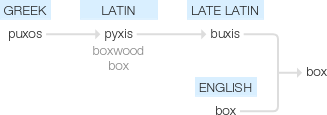Box
late Old English, probably from late Latin buxis, from Latin pyxis ‘boxwood box’, from Greek puxos (see box3).
wiktionary
From Middle English box(“jar (usually cylindrical); type of container; strongbox for valuables or its contents; cupping glass for bloodletting; bone socket”), from Old English box(“box-tree; box, case”), [1] from Proto-West Germanic *buhsā(“box tree; thing made from boxwood; box”), either from Latin buxus(“box tree; thing made from boxwood”), buxum(“box tree; boxwood”) (possibly from πύξος(púxos, “box tree; boxwood”)); or from Late Latin buxis(“box”), Latin pyxis(“small box for medicines or toiletries”) (from Ancient Greek πυξίς(puxís, “box or tablet made of boxwood; box; cylinder”), from πύξος(púxos) + -ῐς(-is, “suffix forming feminine nouns”)). [2]
If the latter derivation is correct, the word is cognate with Middle Dutch bosse, busse(“jar; tin; round box”) (modern Dutch bos(“wood, forest”), bus(“container, box; bushing of a wheel”)), Old High German buhsa (Middle High German buhse, bühse, modern German Büchse(“box; can”)), Swedish hjulbössa(“wheel-box”). [2]
The humorous plural form boxen is from box + -en, by analogy with oxen.
From Middle English box(“box tree; boxwood”), from Old English box(“box tree”), [3] from Proto-West Germanic *buhs(“box tree; thing made from boxwood”), from Latin buxus(“box tree; thing made from boxwood”), buxum(“box tree; boxwood”), possibly from πύξος(púxos, “box tree; boxwood”). [4]
From Middle English box(“a blow; a stroke with a weapon”); [5] further origin uncertain. The following etymologies have been suggested: [6]
From Latin bōx, from Ancient Greek βῶξ(bôx, “box (marine fish)”), from βοῦς(boûs, “ox”) + ὤψ(ṓps, “eye, view”), a reference to the large size of the fish's eyes relative to its body. [8]
etymonline
box (n.1)
"rectangular wooden container," usually with a lid, Old English box, also the name of a type of shrub, from Late Latin buxis, from Greek pyxis "boxwood," pyxion "writing table, box," made of boxwood, from pyxos "box tree," which is of uncertain origin. Beekes suggests a loan-word from Italy, as that is where the tree is native. Dutch bus, German Büchse "box; barrel of a gun," also are Latin loan-words.
Meaning "compartment at a theater" is from c. 1600 (box seat in the theatrical sense is by 1850). Meaning "pigeon-hole at a post office" is from 1832. Meaning "television" is from 1950 (earlier "gramophone player," 1924). Meaning "station of a player in baseball" is from 1881. Graphics sense "space enclosed within borders and rules" is from 1929. Slang meaning "vulva" is attested 17c., according to "Dictionary of American Slang;" modern use seems to date from c. World War II, perhaps originally Australian, on notion of "box of tricks." Box lunch (n.) attested from 1899. The box set "multiple-album, CD or cassette issue of the work of an artist" is attested by 1955. To think or act outside the box "contrary to convention" is attested by 1994.
box (n.2)
"a blow," c. 1300, of uncertain origin, older than the verb, possibly related to Middle Dutch boke, Middle High German buc, and Danish bask, all meaning "a blow;" perhaps imitative; perhaps from some sense of box (n.1) or (v.2).
box (v.1)
"to put into storage, place into a box," mid-15c., from box (n.1). Related: Boxed; boxing.
box (v.2)
"to beat, thrash, strike with the fist or hand," late 14c., from box (n.2). Meaning "to fight with the fists" (intransitive), whether gloved or not, is from 1560s. Related: Boxed; boxing.
box (n.3)
genus of small evergreen trees, Old English, from Latin buxus, from Greek pyxos "box tree," which is of uncertain origin. Beekes suggests a loan-word from Italy, as that is where the tree is native. Compare box (n.1).
